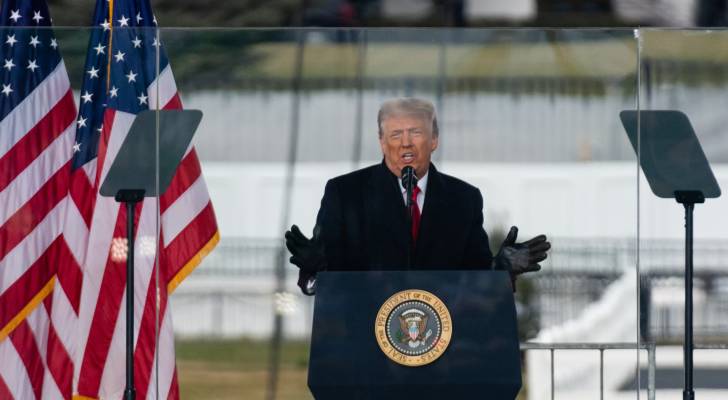Trump addresses supporters on Jan. 6, shortly before members stormed the US Capitol (Credit: The Washington Post)
BBC accused of doctoring Trump speech to suggest he incited Capitol riot
- Whistleblower alleges BBC “doctored” Trump’s speech in a Panorama documentary.
- Edited footage appeared to show Trump encouraging the Capitol riot.
- BBC executives accused of ignoring internal bias complaints.
- Political leaders demand investigation and public explanation.
The BBC is facing mounting pressure after an internal whistleblower alleged that the broadcaster edited a Donald Trump speech in a way that made it appear he had encouraged the January 6 Capitol riot.
The claims, detailed in a 19-page dossier obtained by The Telegraph, accuse the corporation of “deliberate manipulation” and “misleading editing.”
The controversy centers on a Panorama special titled “Trump: A Second Chance?”, aired in October last year, just a week before the US election. The program reportedly spliced together two separate parts of Trump’s January 6, 2021 speech, combining sentences spoken nearly 40 minutes apart to make it sound as though the president had urged supporters to “fight like hell.”
In reality, Trump had urged his audience to “peacefully and patriotically make your voices heard.” The edited version, according to whistleblower Michael Prescott, “made the US president ‘say’ things [he] never actually said.”
The leaked dossier, now circulating in government departments, claims that the BBC’s own internal watchdog raised serious concerns about the Panorama episode, but that senior executives and the BBC’s chairman “refused to acknowledge” any breach of editorial standards.
“If BBC journalists are to be allowed to edit video in order to make people ‘say’ things they never actually said, then what value are the corporation’s guidelines?” Prescott wrote. “Why should the BBC be trusted, and where will this all end?”
- Political backlash -
The revelations have triggered widespread outrage from across the political spectrum. Former Prime Minister Boris Johnson called the situation a “total disgrace,” writing on X that “Britain’s national broadcaster used a flagship program to tell palpable untruths about Britain’s closest ally.”
Nigel Huddleston, the shadow culture secretary, said the revelations “could seriously undermine the brand and reputation of the BBC,” adding that “there can be no justification for this kind of deliberate manipulation.”
Meanwhile, Donald Trump Jr. reposted The Telegraph’s story on X, accusing the BBC of being “just as dishonest and full of s--- as the ones here in America!!!!”
- What the footage showed -
The disputed Panorama edit made it appear that Trump said, “We’re gonna walk down to the Capitol and I’ll be with you and we fight. We fight like hell and if you don’t fight like hell, you’re not gonna have a country anymore.”
But in reality, Trump’s statement about “peacefully and patriotically” making voices heard came 15 minutes into the speech, while the “fight like hell” comment was made nearly 40 minutes later.
The documentary also included footage of Trump supporters marching toward the Capitol, filmed before the president began speaking, creating what Prescott described as a “mangled timeline” that falsely implied Trump’s words triggered the march.
- Calls for accountability -
Conservative lawmakers have demanded a formal investigation into how the program was approved for broadcast. Caroline Dinenage, chair of the Commons culture, media, and sport committee, said the allegations come “at a critical time for the BBC,” and confirmed that her committee will discuss the issue in its next meeting.
The BBC’s Director-General Tim Davie, Chairman Samir Shah, and News Chief Deborah Turness are all named in the report for allegedly ignoring internal warnings. Prescott compared the situation to the 2007 “Crowngate” scandal, when misleadingly edited footage of Queen Elizabeth II led to a BBC executive’s resignation.
A BBC spokesperson responded, “While we don’t comment on leaked documents, when the BBC receives feedback it takes it seriously and considers it carefully. Differing views of our coverage are routinely discussed and debated.”
With the corporation’s royal charter renewal set for 2027, the scandal could have far-reaching implications for its future funding and credibility.




